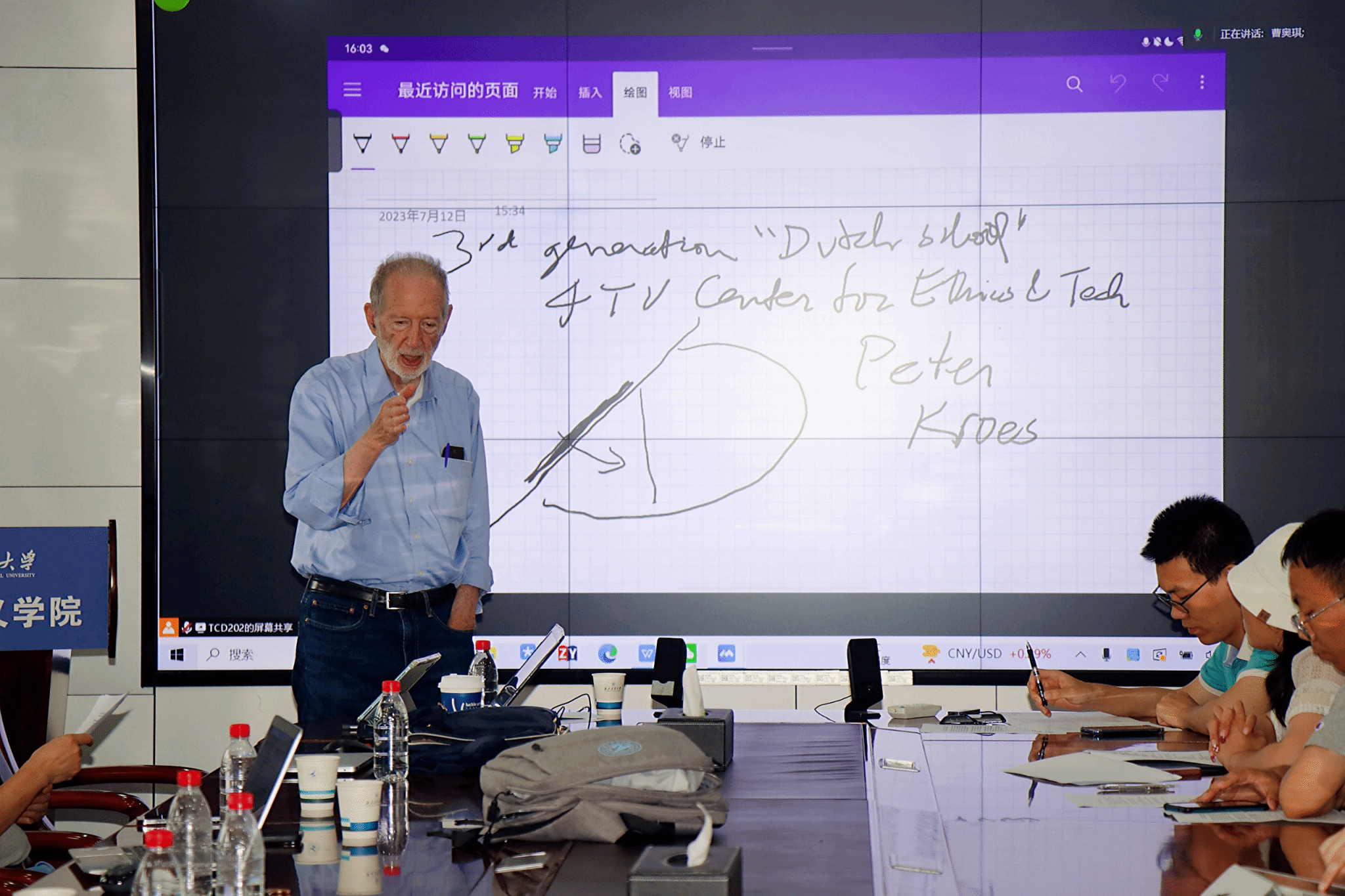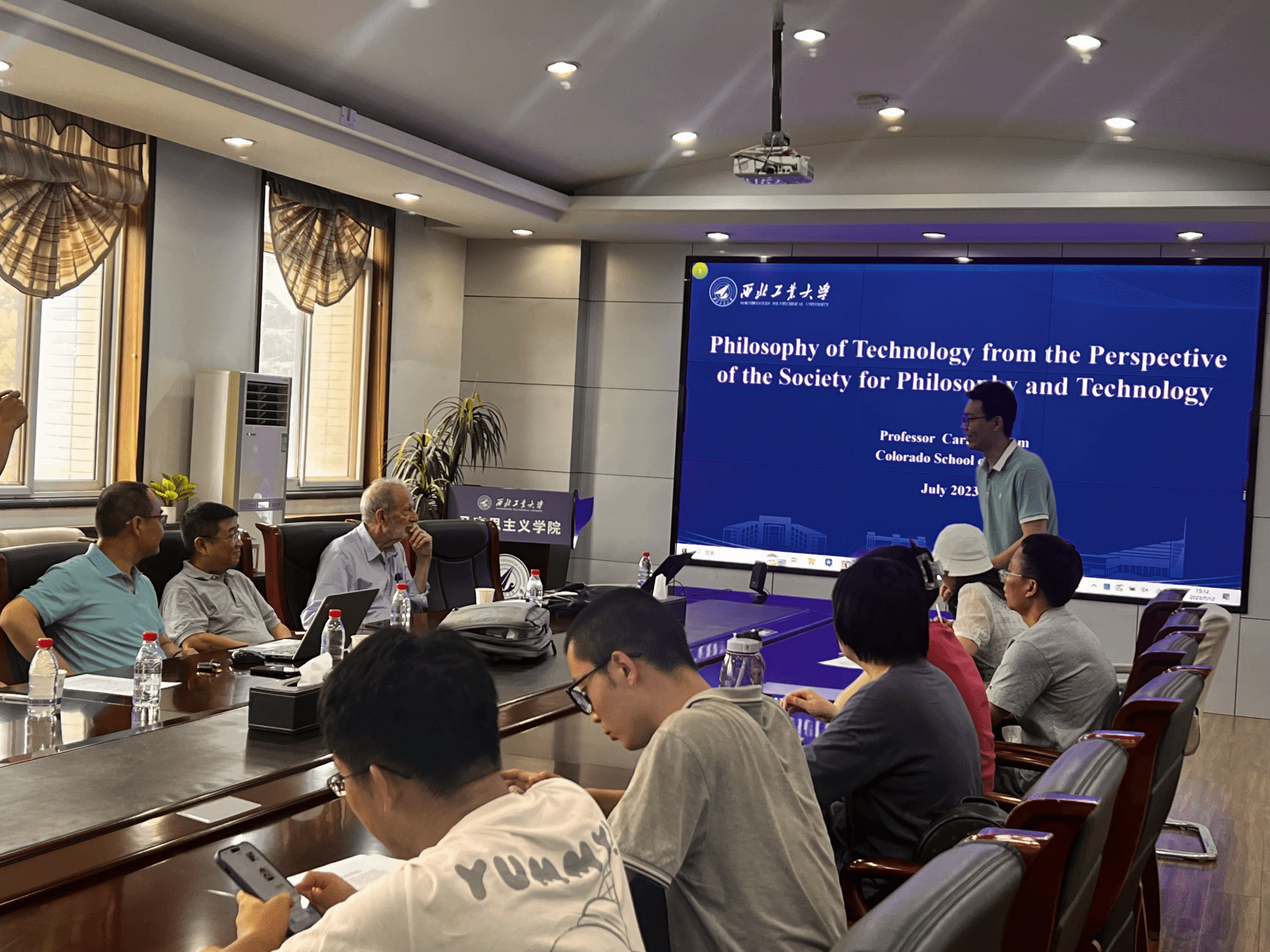(Article and Photo/Wang Yaoguang, Review/Li Gang)
on 12 July 2023 at 3 p.m., Carl Mitcham, a famous contemporary philosopher of technology and engineering ethicist, the first president of the Society for Philosophy and Technology (SPT), and a professor of the College of Humanities, Arts and Social Sciences of Colorado School of Mines, was invited to the School of Marxism of Northwestern Polytechnical University for academic exchanges. Professor Deng Bo of Xi'an University of Architecture and Technology, Professor Ma Delin of Xi'an University of Electronic Science and Technology, Professor Zhang Yunlong, Assistant Professor Chen Qianqian and current graduate students of the School attended the seminar. Associate Professor Lv Tianze of the School of Marxism hosted the meeting.

At the beginning of the talk, Professor Mitcham introduced the development of the philosophy of engineering and technology around the theme of Philosophy of Technology from the Perspective of the Society for Philosophy and Technology. He said that the philosophy of engineering and technology is a small but growing area of academic debate, which has expanded through the Society for Philosophy and Technology (SPT) since its emergence in the 1950s. He argues that from the SPT's perspective, the study of the philosophy of engineering and technology can be divided into three stages of development. The first stage is the classical European philosophy of technology, including the related technological ideas of Martin Heidegger (1889-1976), Jacques Ellul (1912-1994), and Alan Turing (1912-1954), and the three basic approaches to the study of the philosophy of technology: phenomenology, sociology, and analytic philosophy. The second phase is the new "American School" of philosophy of technology, which has been based in the Philosophy Department since the 1970s (1970-1979) and has been developing research in the philosophy of engineering and technology. In his report, Professor Mitchum pointed out that the 1980s was the decade (1981-1989) when the school laid the foundation for the study of engineering and philosophy of technology, and the 1990s was the decade (1991-1999) when it was searching for directions. The third phase (the empirical turn) was the new "Dutch school" of philosophy of technology, based on the universities of engineering. According to Professor Mitcham, this phase consisted of three key events: the "empirical turn in the philosophy of technology" and the "dual nature of the technological object" research project carried out by Peter Kroes at the Delft University of Technology in 1998. In 2001, Hans Achterhuis edited the book The Empirical Turn in American Philosophy of Technology, and in 2007, he founded the Centre for Ethics and Technology at 3TU (a consortium of the three leading universities of technology in the Netherlands, including Delft University of Technology, the Eindhoven University of Technology and the University of Twente). In addition, Professor Mitcham presented his vision for the future of research in the philosophy of engineering and technology.


Focusing on this theme, the teachers and students in the audience had in-depth exchanges and discussions with Prof Mitcham on Marx's theories on machines and technology, the ontological problems of engineering and technology, and the ethics and politics of engineering. Professor Mitcham's profound thoughts, rigorous learning style and passion for academics deeply infected and inspired all the teachers and students present. At the same time, Prof Mitcham responded positively to Zhang Yunlong's question about overseas study and joint training of postgraduates, saying that he could contact the university and help the teachers and students as a recommender.

The seminar not only let the teachers and students of the college appreciate the research direction and scholarly style of the international first-class philosophers, and broadened their international vision, but also helped to promote the internationalisation of the college. It is hoped that more teachers and students of the School of Marxism will go international in the future, telling Chinese stories and spreading the excellent achievements of the Chineseisation of Marxism while learning technical knowledge from abroad, and showing the style of teachers and students of the School of Marxism of NPU in the international arena.